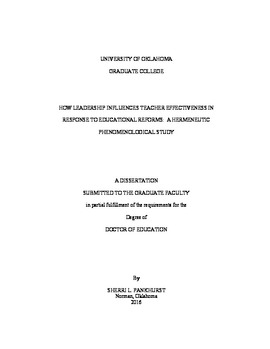| dc.description.abstract | In 2009 a rash overhaul of educational reform occurred in our nation’s educational system, specifically preempted by Race to the Top. Administrators and teachers have been in a flux of understanding the importance of these prescribed educational changes and the necessity to implement a different pedagogy within the classroom. For teachers to embrace educational reform changes, leadership is essential to weave through this maze of complexity to achieve school change. Most educational initiatives are structured around a governance approach and motivated by political systems (Harvey, Cambron-McCabe, Cunningham, & Koff, 2013). These educational reform measures are normally viewed as a top down approach when it comes to implementing policy (Turnbull & Turnbull, 2000). There seems to be a concretive effort to keep teachers out of the decision-making process in regard to educational reform. There is a need for teacher input within the discussions of educational reform because the teacher has a central understanding of their work (Spencer, 1996; Hargreaves, 1996). Teachers are seen as pawns in political schemes instead of respected as key components of educational reform (Edwards, 2011). This research examines the meaning of the teacher-leader relationship within an educational reform process. These teacher-leader relationships are important within the educational realm because it presents an unscripted insight to leadership influences on teacher effectiveness. To gain insight of teacher experiences, this research uses hermeneutic phenomenology, to analyze the teachers’ situation in the world (Friesen, Henriksson, & Saevi, 2012) and utilizes van Manen’s (2014) five existential life-worlds: temporality (lived time), corporeality (lived body), relationality (lived self-other), spatiality (lived space), and materiality (lived things) to examine how teachers’ describe school leadership that promotes/contributes to teacher effectiveness. Thematic threads of strategies, states-experience/support, participation/interactions and consequences were illuminated through data analysis and were examined through van Manen’s (2014) five existential life-worlds. An overlay of these primary thematic findings led to the identification of superordinate themes of support, communication, and inclusion as effective leadership practices for implementation of educational reform measures. Specifically from the teachers’ experiences within this study, support, communication and inclusion are important factors of leadership practice to promote teacher effectiveness during implementation of educational reform measures and answer the research question: What are select, high performing teachers’ lived experiences working with their school leader during near recent educational reform? The study’s implications of educational practice for school leadership effectiveness and contributions to research show when leaders utilize a two-way communication, provide professional development and instructional feedback support, and actively include teachers throughout the phases of integrating educational reform. These leadership practices provide direct and indirect influential actions. They correlate with supervision of instruction for school effectiveness and student achievement. In conclusion, this research finds there is a need for including supportive models in leaders’ trainings, for ensuring leadership standards speak of specific ways of communicative efforts, and for building teams for teacher inclusion to promote teacher effectiveness during educational reform. | en_US |
